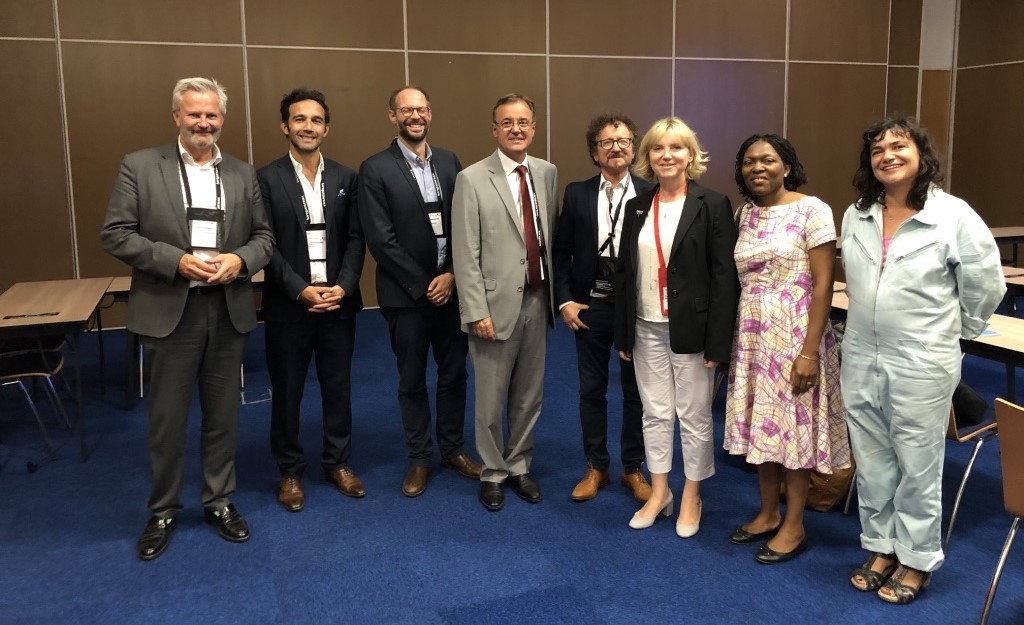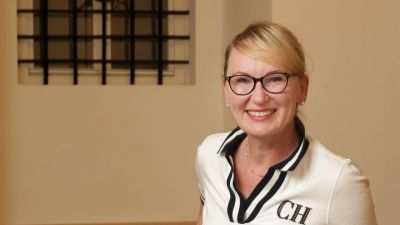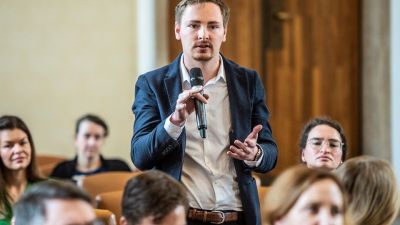She is an internationally recognised Czech scientist and recently became the first woman to receive the Czech Head Award. Professor Zuzana Moťovská received the government’s top scientific prize for 2023 for her outstanding contribution to the field of cardiology.
Most days, you can find Professor Zuzana Moťovská at the Cardiac Centre of the Cardiology Clinic of the Third Faculty of Medicine of Charles University and the Královské Vinohrady University Hospital. As part of the team in the Division of Acute Cardiology, she treats patients with cardiovascular disease, including myocardial infarction, heart failure, pulmonary embolism, and arrhythmia. Medical students from the Third Faculty of Medicine regularly visit her at Hall S, as did Forum magazine.
Professor, what kind of impact has receiving the Czech Head had on your work?
I have given it some thought, and I think it has been beneficial. Thanks to the award, I will be able to show the broader public positive details about my workplace and the role we play. In the past, for me, gender was not really an issue, and I never thought about the limitations of being a woman in this type of work. I myself don’t care whether my co-workers are female or male when I am interviewing them for a job. What matters are completely different criteria: their relationship with patients, knowledge, personality, whether they are hardworking. However, if my success can show up-and-coming female scientists the way, that it is possible to combine a career with parenthood, I will be happy. I am extremely pleased with the interest I have received since getting the prize – I really appreciate it.
Did you expect the surge in media interest?
I definitely don’t want to become a media star. But I can say ‘No’ if I have to.
How hard is it to do good science? Is it easier abroad?
When, like me, you do clinical research at a functioning clinic, it’s always more challenging than if you were part of a purely scientific institution. But I have never felt the need to compare and claim that it might be better elsewhere. I make demands on myself rather than the place I work. I often ask myself: have I done everything for my team, did I use all the available grants, did I work enough and with enough inventiveness, could I have done better?
To come back to your question: it’s good to know how they do things in other places. Thanks to my specialisation, I’ve gotten to know quite a few foreign departments and to work with doctors from abroad. I certainly wouldn’t claim that science is easier abroad. On the contrary, I would say that the environment for clinical cardiology research in the Czech Republic is exceptional and favourable.
We are in the clinic which has ties to the Third Faculty of Medicine of Charles University. I know your “relationship” has lasted more than 20 years. You must be very pleased…
The fundamental thing that inspired me in working at this clinic is that here one can realise one’s ideas. As far back as I can remember, there were always conditions here that encouraged anyone with initiative to come up with good projects.
Was this the influence of Professor Petr Widimský, who recruited you from the University Hospital in Bratislava?
Absolutely. And Professor Widimský, the head of the cardiology clinic and head doctor of the centre, hasn’t changed. Often it is a particular patient who inspires me to look for new ways of treatment and to try to improve the prognosis of patients. I consider the fact that I decided to leave Bratislava more than 20 years ago to come here to be a crucial moment on my professional journey.
What about Czech attitudes? Did anyone ever make you feel out of place?
No, only once did I notice small hints that I should do something to improve my Czech when I was in the office. I feel very comfortable here and I find the cooperation with colleagues across the Czech Republic exceptional and supportive. This is evidenced by the collaboration on numerous clinical research projects. In the end, all cardiac centres are largely involved in projects that I initiated.
What is your team like and who are your closest collaborators?
My core colleagues include both senior physicians and the so-called “rotating” junior team. Our support in caring for patients on the three coronary units is provided by the nurses, in my case principally the station and section nurses. Without their support and work, I could not imagine carrying out clinical research projects.
How do you attract new colleagues to work with you?
This might be a question for them. Acute cardiology, which I am involved in, requires rational judgment from the physician even in tense situations, and you can’t fake it. Respect must be earned. I hope this doesn’t sound presumptuous to say, but I think I can motivate my colleagues and get them excited and enthusiastic and draw them towards a common vision. Teamwork is important to me. We complement each other and solve individual cases. As a team leader, I always try to ensure that there is a good atmosphere. I like my teammates and I am a team player myself.
In 2018, I had the opportunity to talk to you about the important Prague-18 project for the treatment of patients with myocardial infarction. What was the outcome?
The published results of the project, which compare the efficacy and safety of two treatments based on two drugs – ticagrelor and prasugrel – have to date more than five hundred citations and are referenced in all relevant global guidelines for the treatment of patients with coronary artery disease. Great respect is owed to all those involved in the project in the Czech Republic, from doctors to nurses to patients. Now, after five years, we are going to evaluate the long-term results; I believe that we will gain knowledge that could be repurposed. At the end of this year, we will finish recruiting for a large international multi-centre study, the organisation and implementation of which has been the most difficult, most challenging in my professional research endeavours so far. I very much hope that it will provide new and important insights for the treatment of cardiogenic shock, the most lethal complication of acute myocardial infarction.

“I’m very comfortable collaborating with my team,” says Professor Zuzana Moťovská. From left: Dr Jaroslav Ulman, Kateřina Pilíková – section
nurse of the coronary unit, Denisa Odvodyová – station nurse, Professor Motovská, Dr Martin Kozel, Dr Karolína Poledníková.
In addition to being a scientist, you are a doctor and a teacher. Which profession occupies you the most?
I am mainly a doctor: the patient is central to my work and, as I said, the inspiration for my interest in everything else. Clinical research runs parallel to patient care and medical education, which also means an extra amount of work. Medical students are also a source of inventive thinking. I like their reasoning as long as they use logic and it makes sense. It’s important not to put up barriers in this regard, to let students think and look for answers on their own and not just memorise what they have learned.
Apart from medical students, I also supervise PhD students, and I have just “launched” one PhD student into the world. As part of her stay at the prestigious cardiology clinic at the Leiden University Medical Center in the Netherlands, we are preparing a collaboration that I am looking forward to. Cooperation with excellent partners enhances the quality of our research and paves the way for more shared projects. I simply try to cover all three areas according to the current needs of the department. As the saying goes: everything is connected.

A meeting between Professor Zuzana Mot'ovska and Professor Gilles Montalescot (fourth from left) and his team at Sorbonne University.
Is cardiology an appealing choice for medical students?
Absolutely, yes. In general, medical students are interested in everything. During their internships at our clinic, they often decide to come to our department for a reason: they are intrigued by the field, they like the way we do things, they appreciate the relationships we have here, or perhaps they identify with the broad opportunities that cardio‑logy offers.
What challenges are you facing next?
As soon as I finish my interview with you, I have a conference call with colleagues from other departments. I’m thrilled about how excited they are that we have more work to do together – the feeling is beyond words! For one thing, we are just finishing the international Prague-23 study, in which we were joined by five sites from abroad, and it was very difficult to conduct because it followed unstable patients in cardiogenic shock. To give you an idea: one in two of these patients die – most while still in the hospital. At the same time as evaluating it, we are launching a new project, again international and interdisciplinary, on which we will be collaborating with other specialists from cardiology centres.
How important has support from different areas in your life been?
Without support, I would never have achieved anything. I have a very tolerant and well-grounded husband who provides tremendous support and understanding. He is also a doctor, an anaesthesiologist, so he is no stranger to my working environment. I always wanted a partner who was smarter than me, and I succeeded. That is why I have been able to soar – or fly – in life as I have (smiles).
| Professor Zuzana Moťovská |
|
Zuzana Moťovská comes from Bratislava. After studying general medicine at Comenius University in Bratislava, she worked at the Bratislava University Hospital: first in geriatrics, then in the intensive care unit. Since 2016, she has been a professor of internal medicine at Charles University. In 2005, she joined the Cardiology Clinic of the Third Faculty of Medicine of Charles University and the Faculty of Medicine of Charles University, where she heads the Division of Acute Cardiology. In 2019, she received a Donatio Universitatis Carolinæ research grant at CU. She has extensive scientific collaborations with the most prestigious research institutions in the world including Harvard Medical School, Heidelberg University, and others. Moťovská is an internationally recognised expert in cardiovascular disease, coronary artery disease, atherothrombosis, and atherothrombatotic therapy. As a principal investigator, she is a signatory of a number of multi-centre randomised trials focused on the treatment of coronary artery disease (Prague-8, Prague-18, Prague-23), and her research results are presented annually at the world’s most prestigious cardiology conferences. |





















